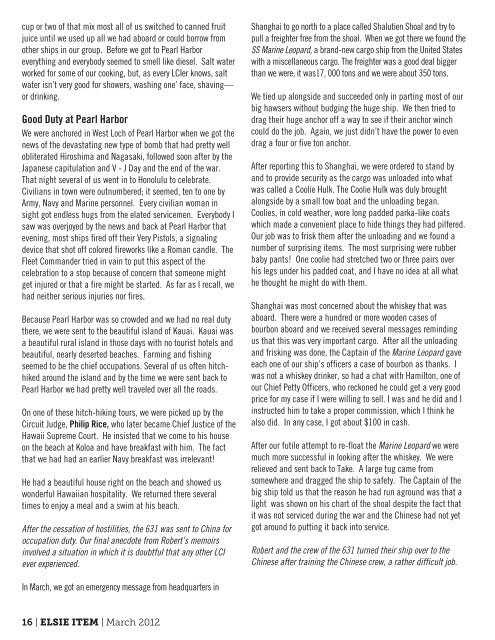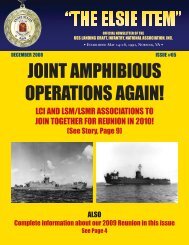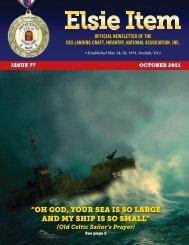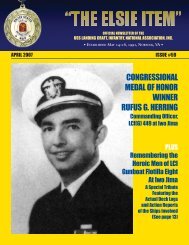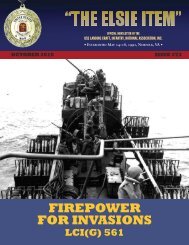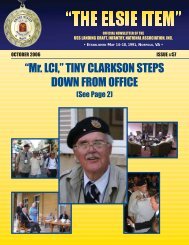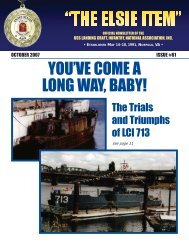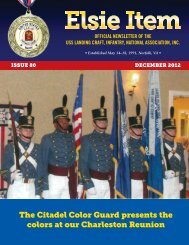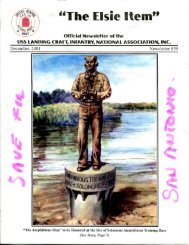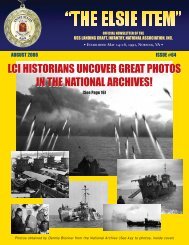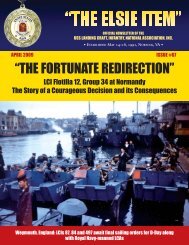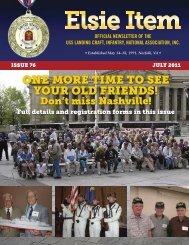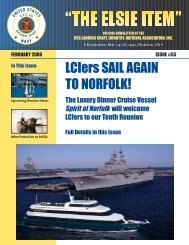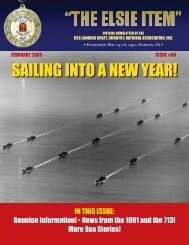elsie item issue 78 - USS Landing Craft Infantry National Association
elsie item issue 78 - USS Landing Craft Infantry National Association
elsie item issue 78 - USS Landing Craft Infantry National Association
- No tags were found...
Create successful ePaper yourself
Turn your PDF publications into a flip-book with our unique Google optimized e-Paper software.
cup or two of that mix most all of us switched to canned fruitjuice until we used up all we had aboard or could borrow fromother ships in our group. Before we got to Pearl Harboreverything and everybody seemed to smell like diesel. Salt waterworked for some of our cooking, but, as every LCIer knows, saltwater isn’t very good for showers, washing one’ face, shaving—or drinking.Good Duty at Pearl HarborWe were anchored in West Loch of Pearl Harbor when we got thenews of the devastating new type of bomb that had pretty wellobliterated Hiroshima and Nagasaki, followed soon after by theJapanese capitulation and V - J Day and the end of the war.That night several of us went in to Honolulu to celebrate.Civilians in town were outnumbered; it seemed, ten to one byArmy, Navy and Marine personnel. Every civilian woman insight got endless hugs from the elated servicemen. Everybody Isaw was overjoyed by the news and back at Pearl Harbor thatevening, most ships fired off their Very Pistols, a signalingdevice that shot off colored fireworks like a Roman candle. TheFleet Commander tried in vain to put this aspect of thecelebration to a stop because of concern that someone mightget injured or that a fire might be started. As far as I recall, wehad neither serious injuries nor fires.Because Pearl Harbor was so crowded and we had no real dutythere, we were sent to the beautiful island of Kauai. Kauai wasa beautiful rural island in those days with no tourist hotels andbeautiful, nearly deserted beaches. Farming and fishingseemed to be the chief occupations. Several of us often hitchhikedaround the island and by the time we were sent back toPearl Harbor we had pretty well traveled over all the roads.On one of these hitch-hiking tours, we were picked up by theCircuit Judge, Philip Rice, who later became Chief Justice of theHawaii Supreme Court. He insisted that we come to his houseon the beach at Koloa and have breakfast with him. The factthat we had had an earlier Navy breakfast was irrelevant!He had a beautiful house right on the beach and showed uswonderful Hawaiian hospitality. We returned there severaltimes to enjoy a meal and a swim at his beach.After the cessation of hostilities, the 631 was sent to China foroccupation duty. Our final anecdote from Robert’s memoirsinvolved a situation in which it is doubtful that any other LCIever experienced.Shanghai to go north to a place called Shalutien Shoal and try topull a freighter free from the shoal. When we got there we found theSS Marine Leopard, a brand-new cargo ship from the United Stateswith a miscellaneous cargo. The freighter was a good deal biggerthan we were; it was17, 000 tons and we were about 350 tons.We tied up alongside and succeeded only in parting most of ourbig hawsers without budging the huge ship. We then tried todrag their huge anchor off a way to see if their anchor winchcould do the job. Again, we just didn’t have the power to evendrag a four or five ton anchor.After reporting this to Shanghai, we were ordered to stand byand to provide security as the cargo was unloaded into whatwas called a Coolie Hulk. The Coolie Hulk was duly broughtalongside by a small tow boat and the unloading began.Coolies, in cold weather, wore long padded parka-like coatswhich made a convenient place to hide things they had pilfered.Our job was to frisk them after the unloading and we found anumber of surprising <strong>item</strong>s. The most surprising were rubberbaby pants! One coolie had stretched two or three pairs overhis legs under his padded coat, and I have no idea at all whathe thought he might do with them.Shanghai was most concerned about the whiskey that wasaboard. There were a hundred or more wooden cases ofbourbon aboard and we received several messages remindingus that this was very important cargo. After all the unloadingand frisking was done, the Captain of the Marine Leopard gaveeach one of our ship’s officers a case of bourbon as thanks. Iwas not a whiskey drinker, so had a chat with Hamilton, one ofour Chief Petty Officers, who reckoned he could get a very goodprice for my case if I were willing to sell. I was and he did and Iinstructed him to take a proper commission, which I think healso did. In any case, I got about $100 in cash.After our futile attempt to re-float the Marine Leopard we weremuch more successful in looking after the whiskey. We wererelieved and sent back to Take. A large tug came fromsomewhere and dragged the ship to safety. The Captain of thebig ship told us that the reason he had run aground was that alight was shown on his chart of the shoal despite the fact thatit was not serviced during the war and the Chinese had not yetgot around to putting it back into service.Robert and the crew of the 631 turned their ship over to theChinese after training the Chinese crew, a rather difficult job.In March, we got an emergency message from headquarters in16 | ELSIE ITEM | March 2012


